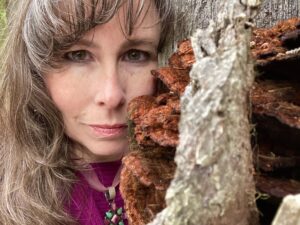
Cassondra Windwalker is the author of the new gothic horror Hold My Place. She has three other published novels, two full-length poetry collections, and a melange of short-form works in literary magazines, anthologies, and art books. She’s lived in the South, the Midwest, and the West, and presently writes full-time from the Frozen North. She keeps company mostly with ghosts, literary characters, unwary wild animals, and her tolerant husband.
What inspired you to start writing?
I don’t know that I ever started writing. My earliest memories are of me narrating the world in my head, my mom telling me stories, my dad reading to me. One day I realized there stood a bridge between the mind and the page, and I took it.
What was it about the horror genre that drew you to it?
Literature is about exploring the human condition and our relationship to all other existence. Aside from want, fear is the most common of all human feeling.
Do you make a conscious effort to include female characters and themes in your writing and if so, what do you want to portray?
No. I tell the stories that come to me, clamoring to be told. But authors who are blind and deaf to particular characters reveal themselves plainly in their books. I think readers of my novels, short stories, and poetry will conclude that there is no one to whom I am not willing to sit and listen. At least, I hope so.
What has writing horror taught you about the world and yourself?
In the end, what makes horror fiction is how it pales to reality. Whatever monstrosities we imagine, the nearer we get to humanity’s ordinary cruelty, the more preposterous it seems.
How have you seen the horror genre change over the years? And how do you think it will continue to evolve?
If you consider Frankenstein as one of the earliest examples, perhaps it is less how the genre has evolved and more how it has returned to its inception. Over recent decades, horror featured gore and shock and sex and functioned primarily as pulp fiction. I think as the world begins to consider more thoughtfully and practically how we interact with the earth and with each other, our horror also takes on a more thoughtful bent. The work becomes as much about creating the ghosts that linger as about the shock value of fear. We are looking closer at our demons.
How do you feel women have been represented thus far in the genre and what hopes do you have for representation in the genre going forward?
It’s a mixed-bag, similar to what we’ve seen in the world of fantasy literature. Too often women are cast as cardboard roles rather than actual nuanced characters, and many times those roles work to play into male fantasies about violence and domination, even when we’re told most earnestly “but this is a strong female character!” Historically women have constituted a small percentage of published authors in general, and much smaller when it comes to horror. The general consensus is that women read books written by both genders, but men tend to read books written by other men. So Big Publishing prefers to bet on male authors. More and more smaller presses are publishing horror, though, and they tend to be progressive in their approach. And happily, it’s not just more women authors that are improving representation. I often read indie horror books and short stories written by men who draw nuanced, compelling characters of all genders.
Who are some of your favorite female characters in horror?
Don’t laugh, but I loved Vera Farmiga’s portrayal of Lorraine Warren in The Conjuring movies. And Chad Ryan’s Esther, in the book Ghost River, is absolutely unforgettable.
Who are some women who write horror you recommend our audience check out?
Oh, crumbs. I hate to list any for fear of leaving some out! Happily readers have far more to choose from than they may have had in the past. But just a scant handful would be Tiffany Meuret, Caytlyn Brooke, Gemma Amor, and Laurel Hightower.
What is one piece of advice you would give horror authors today?
Move past the cheap scare and reach into what truly terrifies you.
And to the women who write horror out there who are just getting started, what advice would you give them?
Horror is exactly the same as every other genre of literature. Be ruthless in pursuit of craft. Plumbing the depths of your characters is paramount. Always tell the truth, no matter how frightening or obscene it is. Always tell the truth. It’s the scariest thing there is.



“Always tell the truth. It’s the scariest thing there is.” I like this.